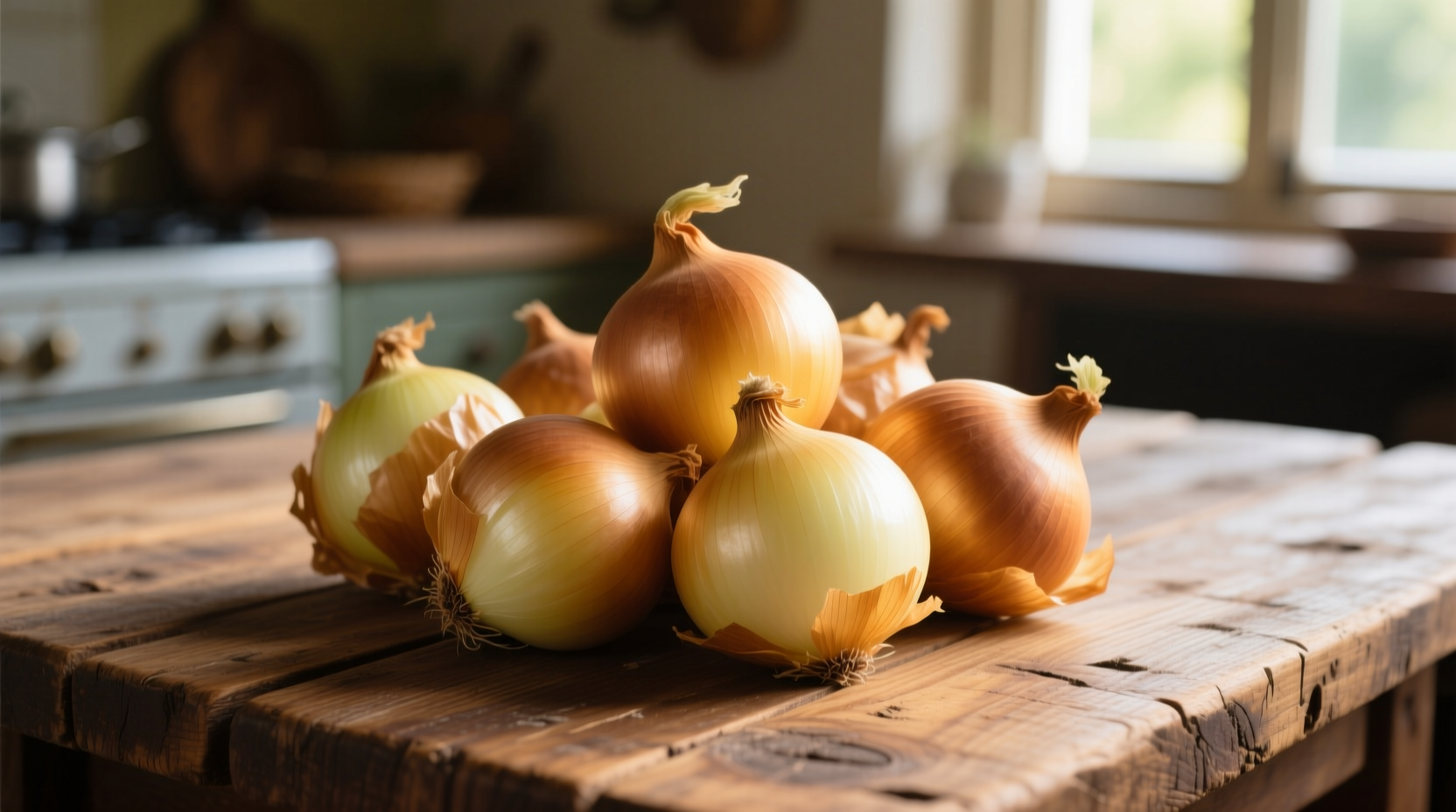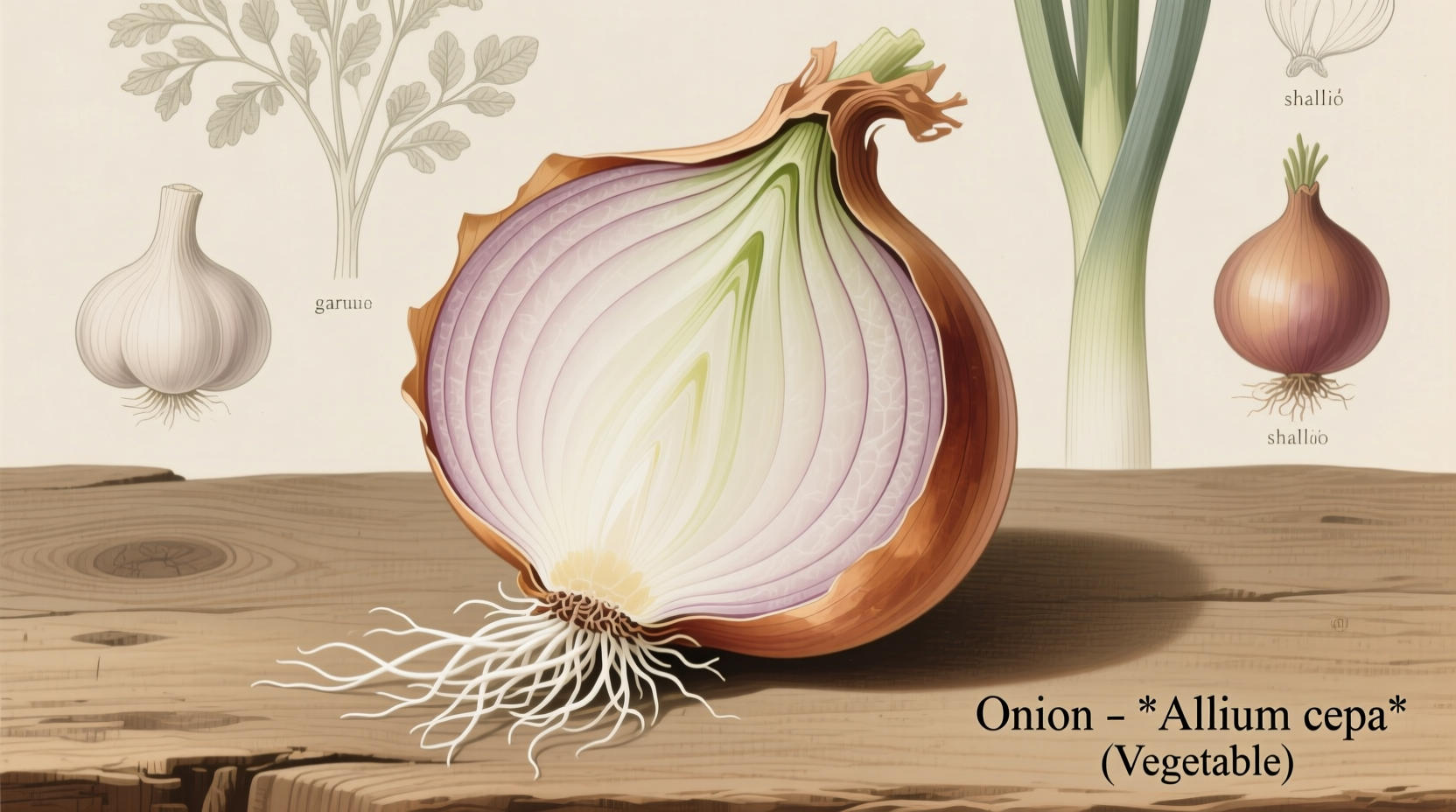Ever wondered whether that pungent kitchen staple in your pantry qualifies as a vegetable or fruit? You're not alone. This seemingly simple question trips up home cooks, gardening enthusiasts, and even culinary students. Let's cut through the confusion with clear botanical facts and practical kitchen insights.
Why Onions Are Vegetables, Not Fruits
Understanding the distinction requires examining both botanical science and culinary tradition. Botanically speaking, fruits develop from the ovary of a flowering plant and contain seeds. Think apples, tomatoes, or cucumbers—all technically fruits because they house seeds.
Onions, however, form from modified underground stems called bulbs. These layered structures store energy for the plant's next growing season. The edible part comes from the leaf bases surrounding the stem, not from any seed-bearing fruit structure. This fundamental biological difference places onions firmly in the vegetable category.
| Classification Type | Vegetable Characteristics | Fruit Characteristics |
|---|---|---|
| Botanical Definition | Non-seed bearing plant parts (roots, stems, leaves, bulbs) | Develop from flower ovary, contain seeds |
| Onion Structure | Bulb formed from modified leaf bases | Does not develop from flower, contains no seeds |
| Culinary Usage | Used in savory dishes, rarely sweet preparations | Typically used in sweet dishes or as standalone snacks |
Botanical vs. Culinary Classification Explained
Here's where confusion often arises: botanical classification differs from culinary usage. While botanists strictly define fruits as seed-bearing structures, chefs categorize ingredients by flavor profile and cooking application.
Consider these examples that highlight the distinction:
- Tomatoes - Botanically fruits (contain seeds), culinarily treated as vegetables
- Cucumbers - Botanically fruits, used as vegetables in cooking
- Peppers - Botanically fruits, prepared as vegetables
Unlike these examples, onions maintain consistent classification across both systems. The USDA's Agricultural Research Service consistently categorizes onions under vegetable and pulses in their nutrient database, confirming their vegetable status in both scientific and nutritional contexts.

Common Misconceptions About Onion Classification
Several myths persist about onion categorization. Let's address the most frequent misunderstandings:
"Onions must be fruits because they grow underground"
This confuses root vegetables (like carrots) with fruits. True fruits never develop underground—they form above ground from flowers. Potatoes, garlic, and onions are all bulb or tuber vegetables, not fruits.
"Sweet onions like Vidalias prove they're fruits"
Sweetness alone doesn't determine fruit status. Many vegetables contain natural sugars—carrots, beets, and sweet corn all have significant sugar content while remaining vegetables. Sugar content relates to growing conditions, not botanical classification.
"Onion flowers mean it's a fruit"
While onion plants do produce flowers (and technically those flowers would produce seed pods that qualify as fruits), the onion bulb itself remains a vegetable. We eat the bulb, not the seed pods.
Historical Context of Onion Classification
Humans have cultivated onions for over 5,000 years, with evidence of their use found in Bronze Age settlements across Europe and Asia. Ancient Egyptians considered onions sacred, using them in religious ceremonies and burial practices. Throughout history, onions have consistently been grouped with other vegetables in agricultural records and culinary texts.
The Royal Horticultural Society classifies Allium cepa (the common onion) within their vegetable database, noting its cultivation requirements align with other bulb vegetables rather than fruiting plants. This historical consistency reinforces the modern botanical understanding.
Practical Implications for Cooks and Gardeners
Understanding onion's vegetable classification matters for both kitchen and garden:
- Companion planting - Onions grow well with other vegetables like carrots and lettuce, but poorly with beans and peas
- Nutritional planning - As vegetables, onions contribute to daily vegetable intake recommendations
- Culinary pairings - Their vegetable status informs traditional flavor combinations in global cuisines
- Growing requirements - Onion cultivation follows vegetable gardening practices, not fruit orchard methods
Professional chefs like those at the Bon Appétit Test Kitchen consistently treat onions as foundational vegetables in mirepoix, sofrito, and other flavor bases—never grouping them with fruits in recipe development.
Related Classification Questions
Understanding onion classification helps clarify other common food categorization questions:
- Is garlic a vegetable? (Yes, also a bulb vegetable)
- Are tomatoes fruits or vegetables? (Botanically fruits, culinarily vegetables)
- Is corn a vegetable? (Yes, though botanically a grain when dried)
Frequently Asked Questions
Why do some people think onions are fruits?
Some confuse sweetness with fruit classification. While certain onion varieties like Vidalias are sweeter, sweetness alone doesn't make something a fruit. Botanical classification depends on plant structure and seed development, not taste.
Are onions considered root vegetables?
No, onions are bulb vegetables, not root vegetables. Root vegetables (like carrots and beets) grow from the plant's actual roots, while bulb vegetables (onions, garlic) form from modified leaf bases surrounding a short stem.
Does the USDA classify onions as vegetables?
Yes, the USDA consistently categorizes onions under vegetables in their nutritional databases and dietary guidelines. They're included in the 'All Vegetables' category for MyPlate recommendations.
Can onions ever be classified as fruits?
Only the seed pods that develop after onion plants flower would be considered fruits botanically. The edible bulb we consume is always classified as a vegetable, both botanically and culinarily.
How does onion classification affect cooking?
Understanding onions as vegetables informs proper cooking techniques. They're typically used in savory applications, form the base of many dishes, and pair well with other vegetables rather than sweet preparations reserved for fruits.











 浙公网安备
33010002000092号
浙公网安备
33010002000092号 浙B2-20120091-4
浙B2-20120091-4